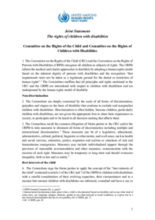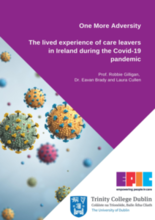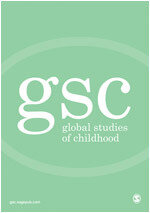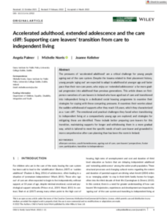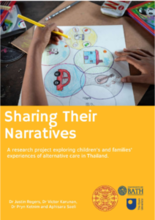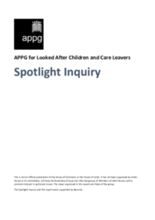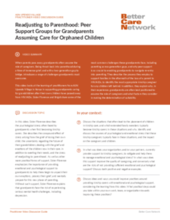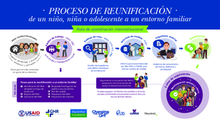Displaying 121 - 130 of 991
In a joint statement published 18 March 2022, the Committee on the Rights of the Child and the Committee on the Rights of Children with Disabilities expressed deep concern about the institutionalisation of children with disabilities and called on States Parties to end institutionalisation on the basis of disability and to promote the development of support for children in a family in the community.
This study explores the lived experiences of care leavers in Ireland during the COVID-19 pandemic.
Informed by a case review of 36 Guatemalan children supported to reintegrate into families, and interviews with social workers and psychologists engaged in the process, this article explores the role of the “community connectedness” wellbeing domain. The authors explore how community connectedness or lack thereof, can contribute to child and parent/caregiver wellbeing and successful reintegration—the different types of community connectedness and who/what was involved in establishing and fostering these connections.
This article draws on first-person narratives of care leavers in Ireland who have aged out of care and transitioned into independent living in a dedicated social housing programme to examine their strategies for coping with these competing pressures.
In this video Chilala Shilimi Nyendwa, Manager of the Family Preservation and Empowerment Program for ACE Zambia, addresses the following questions: social stigma facing reintegrated children; ability of families to financially support their children and how organizations might respond when families cannot; and child safety outside of institutional care.
The overall aims of this research project were to explore the experiences of the children, parents and families involved in alternative care in Thailand. This research project reached a significant number of children (n.160) living in alternative care and their parents and families (n.20).
BICON 2021 was an opportunity for government and intergovernmental representatives, civil society organisations, practitioners, academics and most importantly care experienced young people to come together and discuss the most pressing issues regarding children’s care in Asia. With a focus on implementation, practitioners shared examples of innovation, highlighted promising practices, and showcased local solutions to challenges faced by countries across Asia. The Report is filled with challenges, recommendations, session summaries, speaker bios and more.
This APPG report puts a spotlight on what ‘community’ means to care-experienced people and explores what might be done to help strengthen important community relationships and connections for current and future generations of children in care. The report contains 15 practical recommendations for changes that could be made in the near future to improve the ways in which the care system supports young people to connect with their communities and highlights 5 broader areas where the authors feel serious reform is required that the Department for Education (and others) should consider in greater detail.
This video summary accompanies the Readjusting to Parenthood: Peer Support Groups for Grandparents Assuming Care for Orphaned Children (Upendo Village, Kenya) practitioner learning video which is part of the Kenya Practitioner Learning Video Series.
Este gráfico está destinado a los profesionales que trabajan en los organismos gubernamentales y las organizaciones no gubernamentales que participan en diferentes aspectos del sistema de protección y atención, pero específicamente en el apoyo a la reunificación, y detalla las funciones y responsabilidades específicas de quienes participan en este proceso en Guatemala y cómo deben coordinarse.

